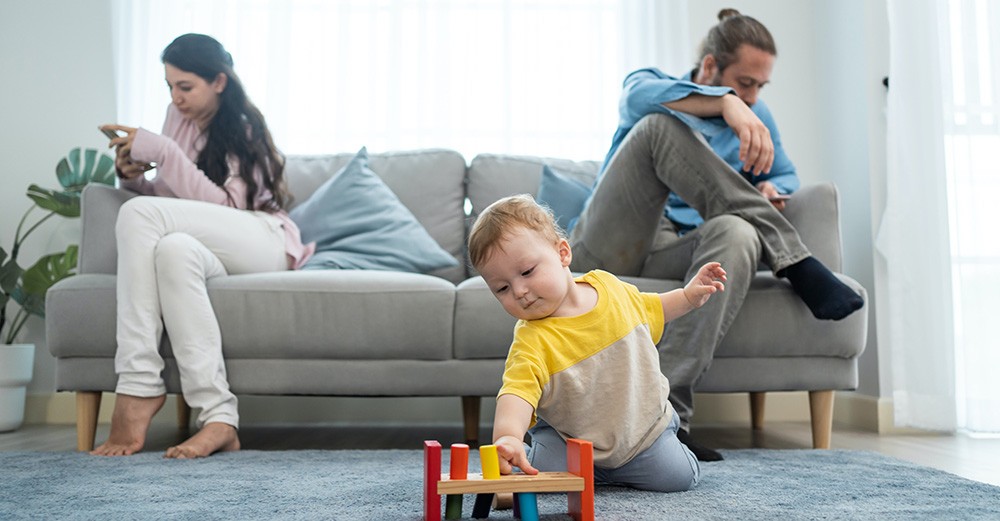Do you think that the impact of your childhood experiences end when you turn eighteen? While you may be legally considered an adult, there isn’t a consensus as to when your childhood truly ends from an emotional and psychological standpoint.
For many people who had an emotionally unstable upbringing, the impact of their childhood continues to affect them in ways they don’t even realize.
Having emotionally unavailable parents could still be affecting you today. From the way you look at others, to how you communicate, your current relationships are likely impacted by the things you were taught or exposed to as a child.
Emotionally Unavailable Parents
Emotional unavailability can look different between families. For some, emotionally unavailable parenting is neglecting the child’s feelings and telling them that they need to be strong. It can also look like a parent investing heavily in their own life and hobbies while ignoring their child’s interests or emotional needs.
From Then Until Now
Many of us like to think that we’re emotionally independent from our parents, but that’s rarely the case. The majority of adults are still being impacted by the things their parents said or did during their childhood. Truly freeing yourself from the impacts of emotionally unavailable parenting can be challenging, but it’s completely worth it.
Before we dive into exactly how you can heal from childhood events, let’s discuss some of the ways that having an emotionally unavailable parent could still be changing your life.
Communication
Do you struggle communicating? Is it difficult to put the right words to what you’re feeling? This may be a sign that you had an emotionally unavailable parent and have difficulties expressing yourself.
As children, we need to learn how to identify the emotions we feel. This is a learned skill and it’s one that we most often pick up from our parents. However, when a parent doesn’t express their emotions or invalidates them, the child misses out on a valuable self-regulation example.
From talking to your boss to having disagreements with your partner, there are so many different ways to communicate – but all of them can be learned to express compassion and kindness..
Trusting Yourself
Watching your parent constantly argue and dismiss their partner’s or their own feelings can actually make it difficult to trust yourself or a partner.
Being able to rely on your inner compass and pinpoint when you’re feeling sad or angry or confused can help you work through your feelings and find a balanced resolution. But often people tend to invalidate their emotions and struggle to accept that they can trust themselves to communicate well and find a resolution.
If you feel that you can’t trust yourself, it can be even harder to trust others. However, trust is a fundamental part of being in a loving relationship – and having the ability to trust is a skill that can be learned.
Selfishness
Do you have some selfish tendencies? It’s likely that those patterns are rooted in your upbringing. Most emotionally unavailable parents are very consumed by their own lives and put their interests-priorities-experiences ahead of their child’s. It’s natural that a child would pick up on this behavior and model it in their own lives.
Familiarity
Our brains search for things that are familiar. Because of this, it’s common for children of emotionally unavailable parents to subconsciously be drawn to others that have this same characteristic.
Having an emotionally unavailable partner is not be the healthiest choice, it can create a false sense of stability and reliability, as that’s what you’re used to from your childhood.
If you notice that you gravitate towards individuals that are emotionally unavailable, you are more than likely continuing the same negative cycles you were raised with. Awareness of this is the first step in finding what you need to end those cycles and begin your personal healing journey.
What Now?
It can be overwhelming to start examining the many ways that your childhood could be impacting you today. If you’ve identified that you had an emotionally unavailable parent you may be thinking… Now what?
If you’re ready to take the first step towards overcoming your past and breaking generational cycles, just now there are new ways to heal that do not have to be years of therapy of painful memories to that you have to reexperience.
Marlise Karlin, a pioneering generational trauma researcher developed an evidenced-based holistic method that has helped tens of thousands worldwide to live fulfilling lives.
You can discover how simple is to take your life back – try the GENESIS Pack with the SOSmethod for Free which allows you to identify what may be holding you back from tapping into your highest potential.

